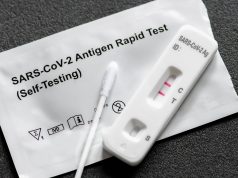More severe acute COVID-19 illness, comorbidities, being unvaccinated all associated with higher risk for long symptoms
By Lori Solomon HealthDay Reporter
THURSDAY, Jan. 19, 2023 (HealthDay News) — Health care utilization is increased in the six months following COVID-19 infection, but vaccination can lower the risk for long COVID symptoms, according to a study published online Jan. 18 in JAMA Network Open.
Stephanie A. Richard, Ph.D., from the Uniformed Services University of the Health Sciences in Bethesda, Maryland, and colleagues sought to identify characteristics associated with persistent post-COVID-19 symptoms. The analysis included data from 1,832 adult U.S. military health system beneficiaries who tested positive for severe acute respiratory syndrome coronavirus 2 (SARS-CoV-2) from Feb. 28, 2020, through Dec. 31, 2021, and were followed for one year.
The researchers found that more than one-third of participants (39.7 percent) had illness that lasted 28 days or longer (28 to 89 days: 19.9 percent; ≥90 days: 19.9 percent). Symptoms lasting ≥28 days were more common among participants who were unvaccinated prior to infection, reported moderate or severe initial illnesses, had more hospitalized days, and had a Charlson Comorbidity Index score of ≥5. Postinfection vaccination among unvaccinated participants was associated with a lower risk for reporting symptoms at six months. At six months after symptom onset, participants had a higher risk for pulmonary, neurological, and mental health-related medical encounters than before SARS-CoV-2 infection.
“Our findings suggest that post-COVID-19 conditions present a major burden to patients and the health care systems that treat them,” the authors write.
Several authors disclosed financial ties to either Janssen or AstraZeneca.
Copyright © 2023 HealthDay. All rights reserved.








